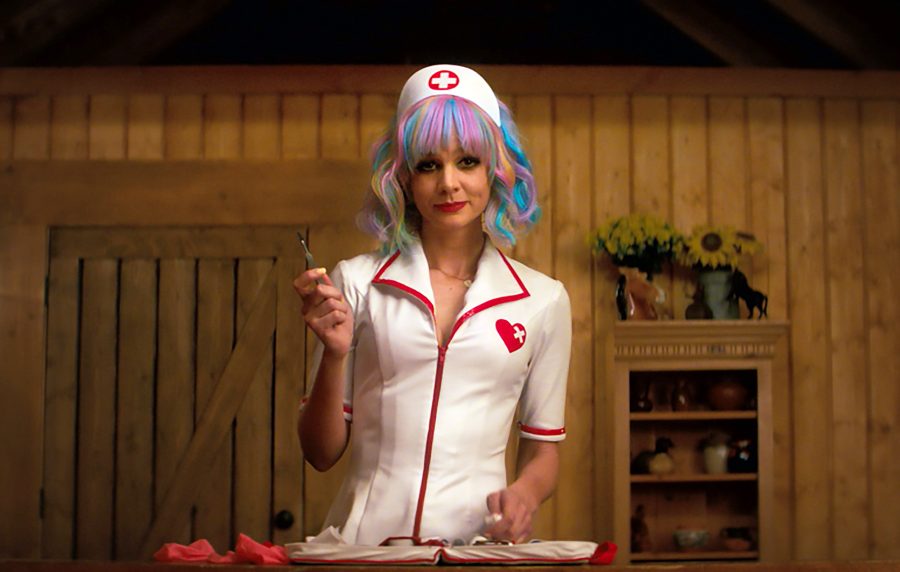Byline: “Promising Young Woman” makes Shane Dawson’s “Not Cool” seem Oscar-worthy.
The following review contains spoilers for “Promising Young Woman.”
Trigger warning: the following review contains sensitive topics of discussion including rape and sexual assault.
Following its release to the film festival circuit on Jan. 25, 2020, Emerald Fennell’s directorial debut “Promising Young Woman” was released to the general public on Jan. 15, 2021. Fennell’s efforts towards this film did not amount to anything, despite many news outlets proclaiming it to be the feminist film of the year and Fennel having both written and produced this project. A horribly written and produced motion picture, “Promising Young Woman” is truly one of the worst movies to hit the big screen since Tommy Wiseau’s “The Room.”
To begin, “Promising Young Woman”’s storyline lacks intention, as several plot points are thrown together with no true meaning behind them. For example, the main character Cassie Thomas (Carey Mulligan) feigns inebriation to single out predatory men who take her home for nonconsensual sex to chastise and punish them. After twenty to thirty minutes of building this plotline without truly unveiling what exactly Cassie does to the men that take her home, the audience is introduced to Ryan Cooper (Bo Burnham), a friend from her medical school who convinces Cassie to go out with him, making her forget her “bring men down and make them understand that they embody rape culture” drive. Before long, it’s gumdrops and rainbows and entire falling-in-love montages—at least until Cassie discovers Ryan’s presence in a video of her best friend’s sexual assault by a fellow medical student, laughing and disregarding the assault competely.
At this point in the film, the narration of the movie switches to a chapter format from a regular sequence of scenes, displaying hot pink roman numerals on-screen to represent the phases of Cassie’s plot to enact revenge on her friend’s rapist. Upon realizing that Ryan is exactly like the men she had been tracking down, she breaks up with him before returning to her quest of abolishing rape culture. Consequently, Ryan and Cassie’s romance is the biggest letdown of the entire film; it is not exceptional storytelling to have the main character, “a proclaimed feminist icon,” fall for a man who is just like the other predators she works tirelessly to chastise. This flaw suggests that Cassie has a feminine weakness—one that dictates that a woman can easily be distracted from her own self-constructed path by a man’s mediocre jokes— which does not bode well for a pro-feminist main character. If anything, she lost some credibility as a writer with a half-hearted potential feminist character.
Ryan is not the only poorly constructed character that Fennell included in her movie. Gail (Laverne Cox), the only BIPOC actor and character with a prominent role in the film, serves as the comic relief of Cassie’s trivial, childish inconveniences. When there is a lull in the story, Gail is used as a narrative crutch to explain Cassie’s next moves in an overt and unimaginative way. If Fennell wanted to cast BIPOC characters she would have, but placing one specific BIPOC actor in a sea of white actors, disappointingly, feels as if Gail is used as a token minority character piece to appease BIPOC audience members, which essentially tells the audience that Fennell was not going to cast a BIPOC actor in this movie. BIPOC actors are not actors to be thrown into supporting roles to help out the amazing white leads; Hollywood has enough of those types of leads and films and Laverne Cox’s character in “Promising Young Woman” is a perfect example.
Additionally, there are many issues with the film’s production quality and narrative intention. Production-wise, it seems as if all of the sequences in the film are segmented and asynchronous with the overall plot structure leading to halts in narrative flow. Audience members get lost in the scenes because character emotions seem to flip from happy, to sad, to happy again while scenes remain five minutes or longer, making for a very confusing and packed sequence. On top of this, the film score is akin to how a high schooler might score their video film final; jarring instrumental preludes shock audience members out of the plot, making it difficult to connect with the characters on screen. There are moments where the film’s audio sounds as if it was done in post-production instead of just refilmed on-scene to maintain natural quality. These different discrepancies in production leave the film with a sloppy and thrown together feel.
“Promising Young Woman” was supposed to be “the feminist film of the year,” yet the plot is overly sympathetic to its problematic male leads. As a result, Cassie becomes heartless and cold when compared to the men in the movie who are written as caring and mindless with a why-would-anyone-hate-me-when-I-work-as-a-child-pediatrician mindset. A true feminist-facing film is one that clearly teaches young femme-presenting individuals that it is possible to stand up against the oppressive community and toxic masculinity that plagues society. Instead, however, this movie leaves the viewer feeling hopeless.
There are a myriad of points I could continue to critique, but I would be left with a dissertation and no readers. There are audience members who are waiting for a film that will make them feel seen or inspire them to create for themselves, and as a result, there should be filmmakers in the industry who believe that to be a top priority. The next time there is mass-market branding for a feminist film of the year, I expect not to give it an F-.
Grade: F-
Director: Emerald Fennell
Starring: Carey Mulligan, Bo Burnham, Alison Brie
Release Date: January 15, 2021
Rated: R
Image courtesy of NBC News.














